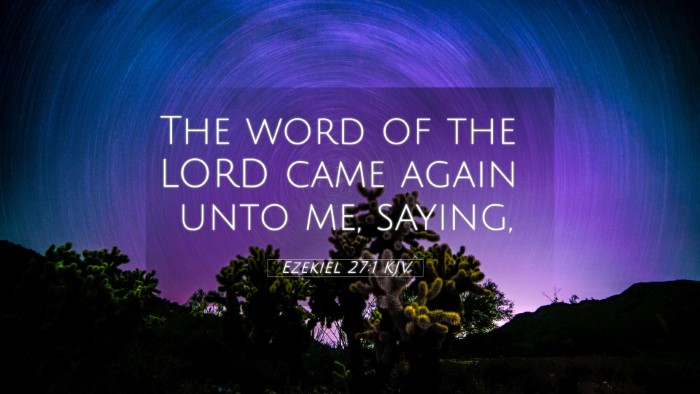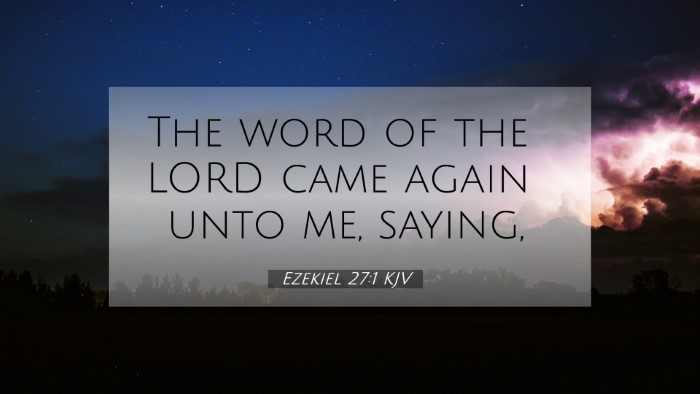Ezekiel 27:1 - Summary and Interpretation
Ezekiel 27:1 states:
"The word of the Lord came again unto me, saying,"
This verse serves as a preamble to a detailed lamentation over Tyre, a prosperous Phoenician city known for its trade and commerce. The chapter unfolds the majestic qualities of Tyre and the impending judgment that God would pour out upon it. The significance of this verse lies in its call to attention from the prophet, emphasizing the divine origin of the message that follows.
Verse Meaning and Insights
Various public domain commentaries give us a deeper understanding of Ezekiel 27:1.
- Matthew Henry:
Henry explains the significance of the prophetic word being highlighted, as it underscores God's active communication with His prophets. The phrase "the word of the Lord came" indicates both authority and urgency. It reveals that no message about Tyre's impending downfall is from mere observation; it is divinely inspired.
- Albert Barnes:
Barnes elaborates on the idea that this verse marks the beginning of a detailed poetic lamentation concerning Tyre. This lament is not arbitrary; it stems from God's judgement against pride and arrogance. By starting with a declaration of God's word, Barnes indicates the inevitability of Tyre’s fate due to its reliance on wealth and power rather than on God.
- Adam Clarke:
Clarke provides noteworthy analysis about the importance of listening to God's warnings. The phrase "came again" indicates the persistence of God's message. It conveys that the Lord does communicate repeatedly, emphasizing His desire for people to heed His instructions and avoid calamity.
Key Cross References
To understand Ezekiel 27:1 further, we can draw parallels with several other Bible verses:
- Ezekiel 26:1: The prophecies against Tyre highlight the impending destruction that foreshadows the lamentation.
- Isaiah 23:1-18: Another lament for Tyre, portraying its fall and God's judgement on its pride.
- Psalms 48:1-3: Celebrating the strength of God and His city, contrasting with Tyre’s downfall.
- Revelation 18:10: The lament regarding the great city of Babylon can be compared to Tyre's fate, demonstrating the universal theme of divine judgment against arrogance.
- Ezekiel 28:17: This verse discusses the king of Tyre, drawing connections to pride and the ultimate fall due to rebellion against God.
- Proverbs 16:18: "Pride goes before destruction," resonating deeply with the themes evoked in Ezekiel's lament.
- Jeremiah 25:22: Concerning the kingdoms of the coast, linking the judgment theme prevalent in Ezekiel against other nations.
- Matthew 11:21-24: Jesus refers to cities that will face woe for unrepentant hearts, reminiscent of Tyre's warning.
- Daniel 4:30-33: The fall of King Nebuchadnezzar due to pride connects thematically with Tyre’s downfall.
- 1 John 2:15-17: Highlights the distinction between the love of the world and God's will, reflecting the fate of those like Tyre who prioritize worldly riches.
Conclusion
The verse Ezekiel 27:1 serves as a powerful reminder of God's sovereignty and the consequences of pride. By understanding this verse and its cross-references, we can gain insight into the broader biblical themes of judgement, repentance, and divine communication.
Thematic Bible Verse Connections
When studying the Bible, the concept of cross-referencing enriches our understanding of scripture. By linking these verses and themes, we can draw connections between God's messages to Tyre and other historical narratives throughout the Bible.
Tools for Bible Cross-Referencing
Utilizing a Bible concordance or cross-reference guide can significantly aid your exploration of related verses. As you delve into the connections between Bible verses, consider the following:
- Utilizing tools for Bible cross-referencing enhances your study experience.
- Consulting a Bible reference resource can provide clarity on how verses relate to one another.
- A understanding of cross-reference Bible study methods can deepen your grasp of Biblical themes.


